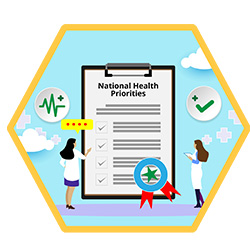AHRQ's PCORTF Strategic Priorities
The PCORTF strategic framework identifies four priorities for improving healthcare delivery that are aligned with AHRQ’s mission and core competencies and that have the potential to improve outcomes that are important to patients. As detailed further below, these priority areas focus on high-quality safe care, chronic conditions, primary care transformation, and trust. AHRQ places equal importance on all four priorities, each of which is integral to the overall vision of equitable, whole-person care across the lifespan. The priorities are interrelated. Thus, projects can simultaneously address multiple priority areas or complement projects in another priority area. Below we introduce each of the priority areas. Download the PCORTF Strategic Framework (PDF, 935 KB) to learn more what AHRQ aims to accomplish within each priority area.
High-Quality, Safe Care That Is Aligned With National Health Priorities
 AHRQ’s goal is to improve quality and safety of healthcare for patients. Ongoing efforts in AHRQ’s Patient Safety and Quality portfolio include enhancing diagnostic safety, preventing healthcare-associated infections (HAI’s), measuring and addressing disparities in care quality, and supporting the National Action Alliance to Advance Patient Safety. AHRQ aims to complement those efforts by leveraging the PCORTF authorization to synthesize and implement PCOR evidence and tools, including clinical decision support, and to train PCOR researchers and workforce to support high-quality, safe care. The focus on national priorities allows for flexibility in the case of emergent or urgent health issues, or other changes in national health priorities. This priority area aligns with the efforts of other HHS agencies. It also aligns with the Institute for Healthcare Improvement’s quintuple aim for healthcare improvement, which includes strengthening population health, care experience, care team well-being, and health equity, and reducing costs.1
AHRQ’s goal is to improve quality and safety of healthcare for patients. Ongoing efforts in AHRQ’s Patient Safety and Quality portfolio include enhancing diagnostic safety, preventing healthcare-associated infections (HAI’s), measuring and addressing disparities in care quality, and supporting the National Action Alliance to Advance Patient Safety. AHRQ aims to complement those efforts by leveraging the PCORTF authorization to synthesize and implement PCOR evidence and tools, including clinical decision support, and to train PCOR researchers and workforce to support high-quality, safe care. The focus on national priorities allows for flexibility in the case of emergent or urgent health issues, or other changes in national health priorities. This priority area aligns with the efforts of other HHS agencies. It also aligns with the Institute for Healthcare Improvement’s quintuple aim for healthcare improvement, which includes strengthening population health, care experience, care team well-being, and health equity, and reducing costs.1
Prevention and Improved Care of People With Chronic Conditions
 People living with multiple chronic conditions (MCC) are particularly vulnerable in our current healthcare system, which is fragmented and disease-focused. Multiple chronic conditions (MCC) are costly and burdensome to patients and their families as well as the healthcare system. AHRQ is the only Federal agency whose primary mission is to develop and disseminate evidence on strategies for improving the patient-centeredness, efficiency, and effectiveness of healthcare delivery. Thus, in 2019 and 2020, AHRQ engaged a number of stakeholders in a series of activities culminating in a summit about improving healthcare delivery for people living with MCC. Stakeholders included patient advocates, clinicians, researchers, health system leaders, community organizations, professional societies/organizations, policymakers, foundations, and Federal partners. In 2021, AHRQ set an agenda to transform care for people living with MCC in a Health Services Research Journal article. This work influenced AHRQ’s PCORTF Strategic Framework. AHRQ aims to leverage the PCORTF authorizations and investments to advance its MCC agenda.
People living with multiple chronic conditions (MCC) are particularly vulnerable in our current healthcare system, which is fragmented and disease-focused. Multiple chronic conditions (MCC) are costly and burdensome to patients and their families as well as the healthcare system. AHRQ is the only Federal agency whose primary mission is to develop and disseminate evidence on strategies for improving the patient-centeredness, efficiency, and effectiveness of healthcare delivery. Thus, in 2019 and 2020, AHRQ engaged a number of stakeholders in a series of activities culminating in a summit about improving healthcare delivery for people living with MCC. Stakeholders included patient advocates, clinicians, researchers, health system leaders, community organizations, professional societies/organizations, policymakers, foundations, and Federal partners. In 2021, AHRQ set an agenda to transform care for people living with MCC in a Health Services Research Journal article. This work influenced AHRQ’s PCORTF Strategic Framework. AHRQ aims to leverage the PCORTF authorizations and investments to advance its MCC agenda.
Patient, Family, Provider, and Community Experience of Care That Enhances Trust in the Healthcare System
 Trust in the healthcare system is essential and is conceptualized on multiple levels. First, trust is important at the interpersonal level between patients, their family members, and the healthcare system. This interpersonal trust is deeply influenced by people’s experiences with the healthcare system and can impact patients’ desire to seek care, confidence in provider recommendations, and patient health behaviors (e.g., medication adherence). Higher patient trust is associated with better health outcomes. Second, it is critical that providers have trust and feel valued by the healthcare systems they work in to help prevent provider burnout. Finally, the framework envisions trust as a concept that goes beyond individuals to entire communities. This broader way of thinking is tied to the deep focus on health equity that acknowledges the impact of structural factors (e.g., racism) that collectively impact entire communities and their experience of care. AHRQ has long invested in generating and disseminating evidence and tools to enhance patient, family, and provider experiences to improve health outcomes. AHRQ aims to leverage the PCORTF further to disseminate and implement them, and train PCOR researchers to use them, with a focus on trust as an outcome.
Trust in the healthcare system is essential and is conceptualized on multiple levels. First, trust is important at the interpersonal level between patients, their family members, and the healthcare system. This interpersonal trust is deeply influenced by people’s experiences with the healthcare system and can impact patients’ desire to seek care, confidence in provider recommendations, and patient health behaviors (e.g., medication adherence). Higher patient trust is associated with better health outcomes. Second, it is critical that providers have trust and feel valued by the healthcare systems they work in to help prevent provider burnout. Finally, the framework envisions trust as a concept that goes beyond individuals to entire communities. This broader way of thinking is tied to the deep focus on health equity that acknowledges the impact of structural factors (e.g., racism) that collectively impact entire communities and their experience of care. AHRQ has long invested in generating and disseminating evidence and tools to enhance patient, family, and provider experiences to improve health outcomes. AHRQ aims to leverage the PCORTF further to disseminate and implement them, and train PCOR researchers to use them, with a focus on trust as an outcome.
Primary Care Transformation
 AHRQ recognizes that revitalizing the U.S. primary care system is foundational to achieve high-quality, accessible, and efficient healthcare for all Americans. AHRQ is a leader in primary care research and serves as the home of the National Center for Excellence for Primary Care Research. In 2020, 30 years after its first primary care research conference, AHRQ again convened diverse participants to provide guidance to AHRQ on a primary care research agenda for the 2020s. The Primary Care Research Conference culminated in 40 research questions in 5 domains for primary care transformation: patient-centeredness; clinicians and practices; systems and infrastructure; community and public health; and equity and disparities. Making substantial progress in any of these areas will require uncovering and addressing long-term issues that exist at the systems level. Although the PCORTF mandates do not include research, the discussions and resulting research questions from the conference inform both PCORTF priorities and strategies. AHRQ aims to advance the goals of primary care transformation by disseminating and implementing relevant PCOR evidence and training PCOR researchers in primary care settings.
AHRQ recognizes that revitalizing the U.S. primary care system is foundational to achieve high-quality, accessible, and efficient healthcare for all Americans. AHRQ is a leader in primary care research and serves as the home of the National Center for Excellence for Primary Care Research. In 2020, 30 years after its first primary care research conference, AHRQ again convened diverse participants to provide guidance to AHRQ on a primary care research agenda for the 2020s. The Primary Care Research Conference culminated in 40 research questions in 5 domains for primary care transformation: patient-centeredness; clinicians and practices; systems and infrastructure; community and public health; and equity and disparities. Making substantial progress in any of these areas will require uncovering and addressing long-term issues that exist at the systems level. Although the PCORTF mandates do not include research, the discussions and resulting research questions from the conference inform both PCORTF priorities and strategies. AHRQ aims to advance the goals of primary care transformation by disseminating and implementing relevant PCOR evidence and training PCOR researchers in primary care settings.



